 We seem to have an outbreak of singles this year; mostly it’s albums coming through the letterbox or into the inbox, but 2020 has seen a few singles, notably three from Danny Schmidt over the summer and one from Tim Grimm in October. In turbulent times, artists will respond with creativity and these have been turbulent times on both sides of the Atlantic. There’s been plenty to write about from both a social and personal point of view and it’s a challenge that’s been taken up by Danny and Tim, and now Ed Dupas.
We seem to have an outbreak of singles this year; mostly it’s albums coming through the letterbox or into the inbox, but 2020 has seen a few singles, notably three from Danny Schmidt over the summer and one from Tim Grimm in October. In turbulent times, artists will respond with creativity and these have been turbulent times on both sides of the Atlantic. There’s been plenty to write about from both a social and personal point of view and it’s a challenge that’s been taken up by Danny and Tim, and now Ed Dupas.
Just so you know, I’m a big fan of Ed Dupas; he’s a superb songwriter with a rough-hewn, lived-in voice and a good acoustic and electric player. We’ve reviewed three of Ed’s albums here over the last few years and generally the songs lean towards melancholy and are very personal, with a few notable exceptions (the stunning “Flag”, “Too Big to Fail” and “State of the Nation”); “This Old Heart” is very different. It’s a mid-tempo song with an uplifting cajun feel (with a synthesised accordion sound, apparently) and it’s a song of immense hope.
The song was started at around the beginning of the COVID outbreak and then set aside until it began to reassert its presence several weeks later as a song of renewal and redemption. The pandemic is far from over, but the presidential election might offer some hope of healing. Who knows? It’s certainly an opportunity.
“This Old Heart” opens and closes with symbolic sounds – it begins with highway noise and an engine igniting to represent the start of the journey, builds up from an acoustic intro to a full band sound, and closes with a heartbeat. What happens in between is the shift from a time of no hope (‘It’s been a long night for a long, long time’) to a future where we might just be able to help each other along. I’ll raise a glass to that.
Check out Ed’s website as well. In addition to the regular music site items, there’s also a blog featuring Ed’s thoughts on many other subjects, which is thoughtful and fascinating.
“This Old Heart” is released in the UK on Friday November 20th.
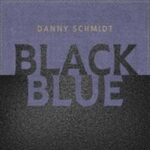 Occasionally, just occasionally a song can be so powerful and visceral that it strips away my natural instinct to ‘give it another listen or two’ before trying to write about it. Danny Schmidt has already done that to me a couple of times this summer with his two ‘state of the nation’ singles, “A Prayer for the Sane” and “2020 Vision”. After listening to the new single “Black & Blue” once, I’m ready to tell you that it’s something you need to hear.
Occasionally, just occasionally a song can be so powerful and visceral that it strips away my natural instinct to ‘give it another listen or two’ before trying to write about it. Danny Schmidt has already done that to me a couple of times this summer with his two ‘state of the nation’ singles, “A Prayer for the Sane” and “2020 Vision”. After listening to the new single “Black & Blue” once, I’m ready to tell you that it’s something you need to hear.
Danny, inspired by the very early civil rights campaigner and escaped slave, Frederick Douglass, looked at the American constitution as a work in progress and, in the light of the George Floyd murder, assessed how far the USA still has to go; it’s a long way. Danny wrote and recorded the song at the end of June and released it on July 4th. On its own, the song is forceful and emotive, but the images Danny has put together for the lyric video ram the message home that this annual review is far from satisfactory.
“Black & Blue” is a heart-rending indictment of the state of affairs in the land of the free today and it’s out now. Don’t take my word for it, just watch the video:
Just like you, The Riot Squad is going crazy at the lack of live music at the moment. We published a piece by Allan in February (just over three weeks before lockdown) celebrating the anniversary of his first gig in 1974. It was really popular and it was followed by a piece celebrating Steve Jenner’s first gig. After three months of musical famine we thought it would be good to ask some of our contributors and some of the artists we’ve reviewed in the past to write about a memorable gig that they saw or played. First out of the blocks was Danny Schmidt. We’re huge admirers of Danny’s work; he’s a gifted, erudite and passionate singer/songwriter (check out the review of his recent brace of singles “A Prayer for the Sane” and “2020 Vision”) and we’re delighted that he’s agreed to share this memory with us:
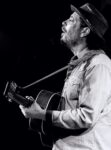
Danny Schmidt by Theo Looijmans
One of the most memorable live shows of my life was the night I saw Eric Johnson at Steamboat in Austin, TX on August 28th, 1990. I remember the date distinctly because it was the day after Stevie Ray Vaughan died. Having grown up in Austin, I was a massive fan of both Eric Johnson and Stevie Ray Vaughan. They were two of my biggest guitar heroes, and I saw them live every chance I got from the time I was old enough to attend live shows. And while their styles were vastly different, they were two branches descended off the same Jimi Hendrix-influenced tree. And as I understood it, they were each huge admirers of the other’s work, if not close personal friends.
In 1990, Eric Johnson’s star was really ascending quickly, and he played two sold out nights, back-to-back at Steamboat, and I had tickets to both nights. The first night was striking because Eric’s management team had upped the production value (and theatrics) of his live shows by having him enter the stage to a huge laser and smoke show, for several minutes, while he improvised riffs with his signature guitar tone, hidden from our view within the visual spectacle. And the guitar built the crowd into a frenzy before the smoke cleared, leaving Eric in a literal star of lasers and a single blinding spotlight from behind, full-on Guitar God, shredding the room from his monolithic place at the center of the stage. It worked my teenage self into an ecstatic state of guitar delirium. That was how the first night of the two-show stand began.
Late that night after we’d all gone home and gone to sleep, in another part of the country, Stevie Ray Vaughan’s helicopter crashed, ending his life tragically, at the age of 35 years old. We all learned of the news first thing the next morning.
The city of Austin was crushed, devastated. The town was silent and shocked. I felt hollow all day, in disbelief. That night, I had to drag myself to Eric’s show, night #2 at Steamboat.
Instead of smoke and lasers and high drama, Eric took the stage silently, no lights, no effects, no roaring feedback guitar, no PA announcer welcoming him to the stage. No one really knew the show was even starting. Instead, he just shuffled to the mic, more of a fragile slumped human being than a guitar god. And instead of shrieks of guitar, he gave a quiet, humble, candid, unrehearsed, vulnerable, heartfelt tribute to Stevie Ray Vaughan. He just told the crowd how much Stevie had meant to him, and how much his work had meant to him. The speech ended when he didn’t have anything else to say. He just stood in silence for an extra few awkward seconds, and then turned and picked up his guitar.
He then proceeded to draw fire from the strings, and fill the room with a whirlwind of sadness, madness, grief, angst, fury, exhaustion, all of it. He brought Stevie Ray’s Texas flood to life inside the walls of Steamboat.
Eric is truly a virtuoso. His technical skills are legendary, and even the hyperbolic statements about what his fingers are capable of doing on the strings are understatements. Some have questioned his musicality and the emotional connection to his songs, or the inaccessibility of his music sometimes. But on that particular night, we all bore witness to what’s possible when a bon afide virtuoso is channelling a well of emotion from the depth of his broken heart to the tips of his mythical fingers.
It was an experience that literally left us all speechless. As much as I remember Eric’s actual playing that night, I remember the faces of my two best friends who were with me at the show even clearer. Between every song we would look at each other and try and utter some sort of statement expressing how amazing it was what we had just witnessed. And instead, we could only stammer nonsensical sounds at each other, unable to form actual thoughts and words. And instead we would just hug or high-five. And then Eric would fire up the next song.
To this day, I can’t properly articulate the power and energy which swirled around the room that night, emanating from the stage, from Eric’s guitar, from Eric himself, with no theatrics . . . just a true master and a room full of open ears meeting together to share a night of grief and celebration. For me, that night set the bar for what’s emotionally possible throughs the kinetic power of music.
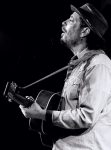 This piece started as a review of “Prayer for the Sane”. As I was writing that, an email from the promo company representing Danny in the UK came through, announcing another single that was being released immediately; two singles out at the same time – that’s pretty unusual. After listening to both singles, it was obvious that they had to be reviewed together; they look at the current situation in America through different lenses. “Prayer for the Sane” is the wide-angle view, looking at the state of the nation as a whole, and “2020 Vision” is the telephoto view, zooming in on the impact on individuals and small communities. Danny feels so strongly about these songs that he’s bypassed the whole planning and scheduling business to get the songs out there while fresh (and raw) and contemporary. Both songs were recorded in quarantine.
This piece started as a review of “Prayer for the Sane”. As I was writing that, an email from the promo company representing Danny in the UK came through, announcing another single that was being released immediately; two singles out at the same time – that’s pretty unusual. After listening to both singles, it was obvious that they had to be reviewed together; they look at the current situation in America through different lenses. “Prayer for the Sane” is the wide-angle view, looking at the state of the nation as a whole, and “2020 Vision” is the telephoto view, zooming in on the impact on individuals and small communities. Danny feels so strongly about these songs that he’s bypassed the whole planning and scheduling business to get the songs out there while fresh (and raw) and contemporary. Both songs were recorded in quarantine.
Danny Schmidt’s a strikingly good songwriter. His songs are witty, clever, original and most important, memorable. I can’t think of another writer who’s come up with a song about string theory. “A Prayer for the Sane”, however, is a bit of a departure; it has all the elements mentioned above, but it’s also a call to arms. Danny’s a very laid-back kind of guy, but the political situation in America today has pushed him down the protest singer route. He never actually uses the ‘T’ word but it’s obvious that he’s alluding to the orange one and the social impact of his term in the White House.
The arrangement for the song is a single guitar with a relatively simple finger-picked backing and some multi-tracked harmonies (The Dannettes, I guess). It’s as stripped-back as the lyrical theme is broad; this is a state of the nation song, a clarion call that highlights the schisms in America today (‘Fences make for consequences, we’re prisoners of our own defences’) and points the way to the solution – ‘It’s time to shake the voting booth, It’s time for us to scream the truth’. It’s a protest song that nails the problems of the States and the wider world today.
Here’s the video:
“2020 Vision” is a much more personal take on the current situation and an even more minimal production. The song structure is a very basic strummed I-IV-V chord progression (three chords and the truth) and the lyrics explore the way we’re dealing with the social changes springing from the pandemic, from social distancing to supermarket shelf clearances and comparisons to our forebears’ experiences in WWII. I won’t quote the lyrics because I’m going to recommend that you watch the video. Amid all the references to our transformed way of life, Danny even manages to fit in a reference to the late, lamented John Prine in the final line of the song.
And here’s the “2020 Vision” video:
These two songs, taken together, are a perfect musical summary of life in the USA in 2020. They convey anger and empathy and demonstrate why Danny Schmidt is so revered among songwriters worldwide.
“Prayer for the Sane” and “2020 Vision” are out now on Bandcamp to download free or pay what you want and will be available later on streaming platforms.
And there’s some late news just in. On Saturday May 9 at 8pm UK time, or 2pm CDT, you can watch Danny and his wife, the equally talented Carrie Elkin, do a free lockdown gig on this link.
 One thing to say right from the start, Danny Schmidt is a superb songwriter; a songwriter’s songwriter if you like, practised in the alchemy of creating gold from, well, algebra, statistics and string theory for a start. Unlikely base metals maybe, but Danny Schmidt’s no ordinary singer-songwriter; he’s a poet, a physicist and a metaphysicist. Keith Richards might claim that you just have to pull songs out of the air, but Danny Schmidt is proof that great songs can be honed and crafted till they shimmer if you have the insight, the inspiration and the skill.
One thing to say right from the start, Danny Schmidt is a superb songwriter; a songwriter’s songwriter if you like, practised in the alchemy of creating gold from, well, algebra, statistics and string theory for a start. Unlikely base metals maybe, but Danny Schmidt’s no ordinary singer-songwriter; he’s a poet, a physicist and a metaphysicist. Keith Richards might claim that you just have to pull songs out of the air, but Danny Schmidt is proof that great songs can be honed and crafted till they shimmer if you have the insight, the inspiration and the skill.
Danny Schmidt’s songs cover a wide range of subjects and styles; he’s convincing with the wordy, technical songs (the album’s title track, for instance) and also has complete mastery of the personal, confessional style that tops and tails “Standard Deviation”. The album has wonderful examples of both of those styles; the title track combines a slightly unconventional love story with an interest in various modern scientific concepts. Also, and Danny doesn’t labour this in the lyrics, he highlights the differences between the relationship between the statistical concept of the normal distribution and the day-to-day us of the word ‘normal’. The lyrical beauty of the song is enhanced by a gorgeous arrangement building up to the entrance of the celestial choir towards the end of the piece.
The song that tops the album, “Wait Til They See You” is exactly the kind of song that a doting father writes about his miraculous and beautiful baby daughter while the closer, “We Need Another Word” asks a serious question about whether the word ‘miscarriage’ is appropriate as a description of a harrowing personal ordeal faced my millions of women every year. I think he has a point. “Bones of Emotion” is an exploration of the of the turbulent undercurrents of a family gathering at Christmas, while “Newport ‘65” is a deceptively straightforward look at Dylan’s move away from conventional acoustic folk, which highlights the dangers of being seen as a prophet – acolytes crave certainty and react badly when that certainty is taken away.
“Standard Deviation” is a great example of the songwriter’s art; songs covering a wide variety of styles and topics set in arrangements that make them sparkle and shine.
The album is released in the UK on Friday March 29th on Live Once Records (LOR CD 10) and Danny will be touring the UK in May.
Meanwhile, just bury yourself in this:
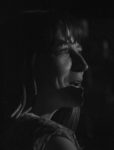 Every once in a while a gig comes along that restores your faith in London audiences; this was one of those gigs. The basement of The Slaughtered Lamb was packed to bursting with music fans and every single one of them wanted to listen and pay attention to two superb and engaging performers, Carrie Elkin and Danny Schmidt. Both were on stage throughout the two sets, but the opening set featured Danny Schmidt’s songs with Carrie supplying harmonies while the second set was mainly songs from Carrie’s outstanding new album, “The Penny Collector”. Throughout both sets, Carrie and Danny, singly and as a double act, kept the audience entertained with jokes, anecdotes and outright weirdness as a counterpoint to the beauty of the songs.
Every once in a while a gig comes along that restores your faith in London audiences; this was one of those gigs. The basement of The Slaughtered Lamb was packed to bursting with music fans and every single one of them wanted to listen and pay attention to two superb and engaging performers, Carrie Elkin and Danny Schmidt. Both were on stage throughout the two sets, but the opening set featured Danny Schmidt’s songs with Carrie supplying harmonies while the second set was mainly songs from Carrie’s outstanding new album, “The Penny Collector”. Throughout both sets, Carrie and Danny, singly and as a double act, kept the audience entertained with jokes, anecdotes and outright weirdness as a counterpoint to the beauty of the songs.
Danny’s opening set demonstrated the huge range of his writing and performance, from the barnstorming opener with about half a dozen false endings to the intensely personal song “We Need another Word” and the very wordy closer “Stained Glass”. As a songwriter, he can do the simple, moving songs but also has the more unusual ability to create songs that are packed with witty ideas without sounding self-consciously clever.
For the second set, the emphasis shifted to Carrie and the new album while Danny played guitar and added some gorgeous harmonies to a set of songs written at a pivotal and emotional point in their lives. The context of the album is made fairly clear by the narrative, but in the live setting Carrie and Danny added observations and anecdotes to flesh out the picture; some are poignant, some are just hilarious. Their set featured a couple of covers, Paul Simon’s “American Tune” (featured on the album) and Richard Thompson’s “Dimming of the Day” with the remainder of the set coming mainly from the new album, including “New Mexico”, “Always on the Run”, the hauntingly beautiful “And Then the Birds Came”, and “Live Wire” and “Tilt-a-Whirl” which explore different eras in the process of growing up. Carrie’s energy and good humour would pull you in to her orbit even if the songs were average (they’re not), and the fun between songs acts as a a counterpoint to the seriousness of the material.
Carrie Elkin and Danny Schmidt poured heart and soul into creating a performance that kept the audience transfixed and lifted the spirits of everyone in the room. They even dispelled the gloom of public transport in London late at night. Good work Green Note for promoting the show, and you can still see Carrie and Danny around the UK until Sunday June 11.
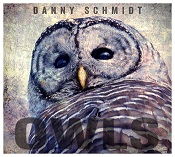 It might seem like a really obvious statement but this album is all about the songs. What it isn’t about is overblown production techniques, flashy solos or drums like cannons. It’s a group of musicians playing live in the studio, trying to get to the heart of eleven songs without bludgeoning the songs into submission. Danny Schmidt is a songwriter from Austin, Texas who fits perfectly into the seventies singer-songwriter mould (often used as a lazy comparison, but this time it’s absolutely spot on) with hints of Leonard Cohen, Neil Young and perhaps even Jackson Browne. On “Owls” (his seventh studio album), his band of Mike Meadows (drums), Andrew Pressman (bass), David Goodrich (electric guitars), Lloyd Maines (lap steel) and Carrie Elkins and Daniel Thomas Phipps (backing vocals) provide a backdrop that ranges from the ethereal, Mexican-accented “Girl with Lantern Eyes” through the Dylan-era Band of “The Guns and the Crazy Ones” to the moody, foreboding and doom-laden “Paper Cranes”. There’s even a bit of a rock ‘n’ roll flavour to the environmental anthem “Soon the Earth Shall Swallow”.
It might seem like a really obvious statement but this album is all about the songs. What it isn’t about is overblown production techniques, flashy solos or drums like cannons. It’s a group of musicians playing live in the studio, trying to get to the heart of eleven songs without bludgeoning the songs into submission. Danny Schmidt is a songwriter from Austin, Texas who fits perfectly into the seventies singer-songwriter mould (often used as a lazy comparison, but this time it’s absolutely spot on) with hints of Leonard Cohen, Neil Young and perhaps even Jackson Browne. On “Owls” (his seventh studio album), his band of Mike Meadows (drums), Andrew Pressman (bass), David Goodrich (electric guitars), Lloyd Maines (lap steel) and Carrie Elkins and Daniel Thomas Phipps (backing vocals) provide a backdrop that ranges from the ethereal, Mexican-accented “Girl with Lantern Eyes” through the Dylan-era Band of “The Guns and the Crazy Ones” to the moody, foreboding and doom-laden “Paper Cranes”. There’s even a bit of a rock ‘n’ roll flavour to the environmental anthem “Soon the Earth Shall Swallow”.
Lyrically, “Owls” is an album that’s worth digging into because not everything reveals itself at the first listen; Danny Schmidt makes extensive use of parable, metaphor and intricate rhyming schemes in his quest to convey his insights, which range from the political concerns of “The Guns and the Crazy Ones” and “Soon the Earth will Swallow” to the very personal “Girl with Lantern Eyes” and “Cry on the Flowers”. These songs will make you sad and make you angry; they might even make you think.
And this is where we get to the really subjective bit. While Danny’s fragile tenor works really well most of the time, conveying emotion and fragility, there are times when the vibrato becomes a distraction from rather than an enhancement to the song. I know some of you might like this, and I’m not saying you’re wrong, but it’s a bit overdone for my taste. Otherwise it’s a bunch of great songs on interesting lyrical themes played tastefully by a great band providing frameworks which enhance the power of the songs.
Out Monday May 18 on Live Once Records (LORCD09).


